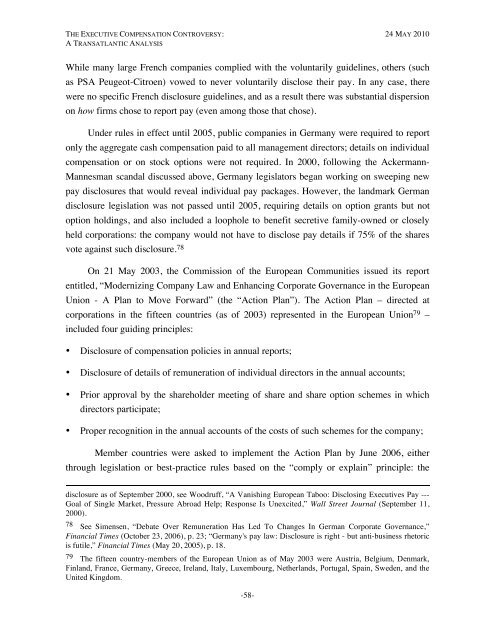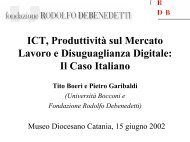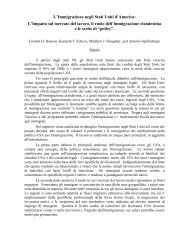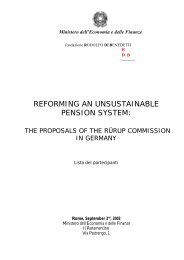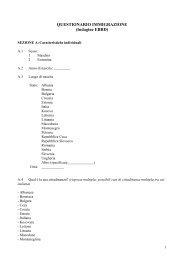The Executive Compensation Controversy - Fondazione Rodolfo ...
The Executive Compensation Controversy - Fondazione Rodolfo ...
The Executive Compensation Controversy - Fondazione Rodolfo ...
You also want an ePaper? Increase the reach of your titles
YUMPU automatically turns print PDFs into web optimized ePapers that Google loves.
THE EXECUTIVE COMPENSATION CONTROVERSY: 24 MAY 2010A TRANSATLANTIC ANALYSISWhile many large French companies complied with the voluntarily guidelines, others (suchas PSA Peugeot-Citroen) vowed to never voluntarily disclose their pay. In any case, therewere no specific French disclosure guidelines, and as a result there was substantial dispersionon how firms chose to report pay (even among those that chose).Under rules in effect until 2005, public companies in Germany were required to reportonly the aggregate cash compensation paid to all management directors; details on individualcompensation or on stock options were not required. In 2000, following the Ackermann-Mannesman scandal discussed above, Germany legislators began working on sweeping newpay disclosures that would reveal individual pay packages. However, the landmark Germandisclosure legislation was not passed until 2005, requiring details on option grants but notoption holdings, and also included a loophole to benefit secretive family-owned or closelyheld corporations: the company would not have to disclose pay details if 75% of the sharesvote against such disclosure. 78On 21 May 2003, the Commission of the European Communities issued its reportentitled, “Modernizing Company Law and Enhancing Corporate Governance in the EuropeanUnion - A Plan to Move Forward” (the “Action Plan”). <strong>The</strong> Action Plan – directed atcorporations in the fifteen countries (as of 2003) represented in the European Union 79 –included four guiding principles:• Disclosure of compensation policies in annual reports;• Disclosure of details of remuneration of individual directors in the annual accounts;• Prior approval by the shareholder meeting of share and share option schemes in whichdirectors participate;• Proper recognition in the annual accounts of the costs of such schemes for the company;Member countries were asked to implement the Action Plan by June 2006, eitherthrough legislation or best-practice rules based on the “comply or explain” principle: thedisclosure as of September 2000, see Woodruff, “A Vanishing European Taboo: Disclosing <strong>Executive</strong>s Pay ---Goal of Single Market, Pressure Abroad Help; Response Is Unexcited,” Wall Street Journal (September 11,2000).78 See Simensen, “Debate Over Remuneration Has Led To Changes In German Corporate Governance,”Financial Times (October 23, 2006), p. 23; “Germany's pay law: Disclosure is right - but anti-business rhetoricis futile,” Financial Times (May 20, 2005), p. 18.79 <strong>The</strong> fifteen country-members of the European Union as of May 2003 were Austria, Belgium, Denmark,Finland, France, Germany, Greece, Ireland, Italy, Luxembourg, Netherlands, Portugal, Spain, Sweden, and theUnited Kingdom.-58-


